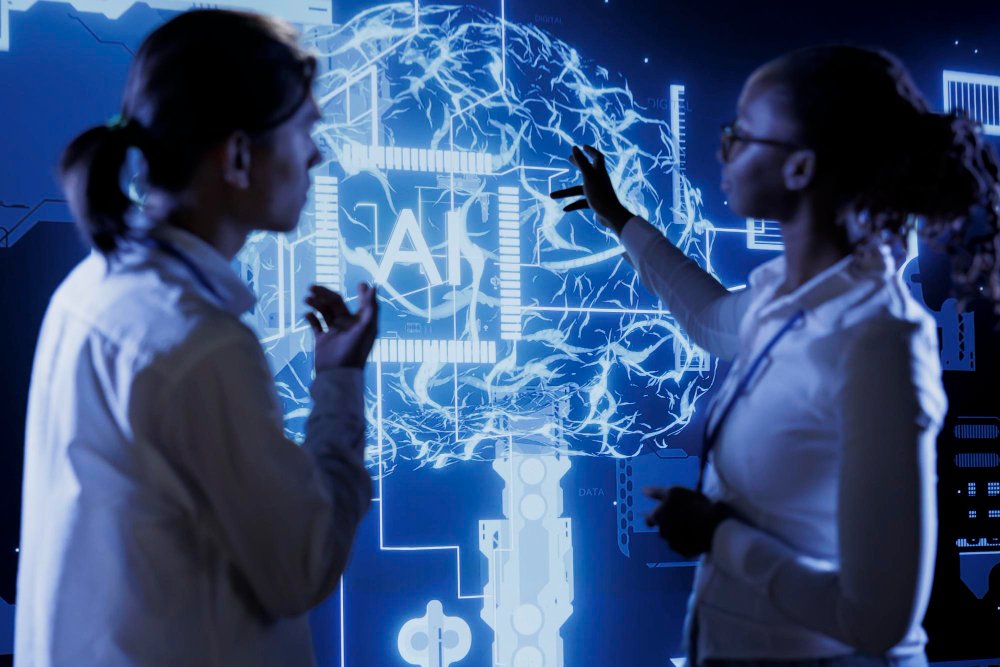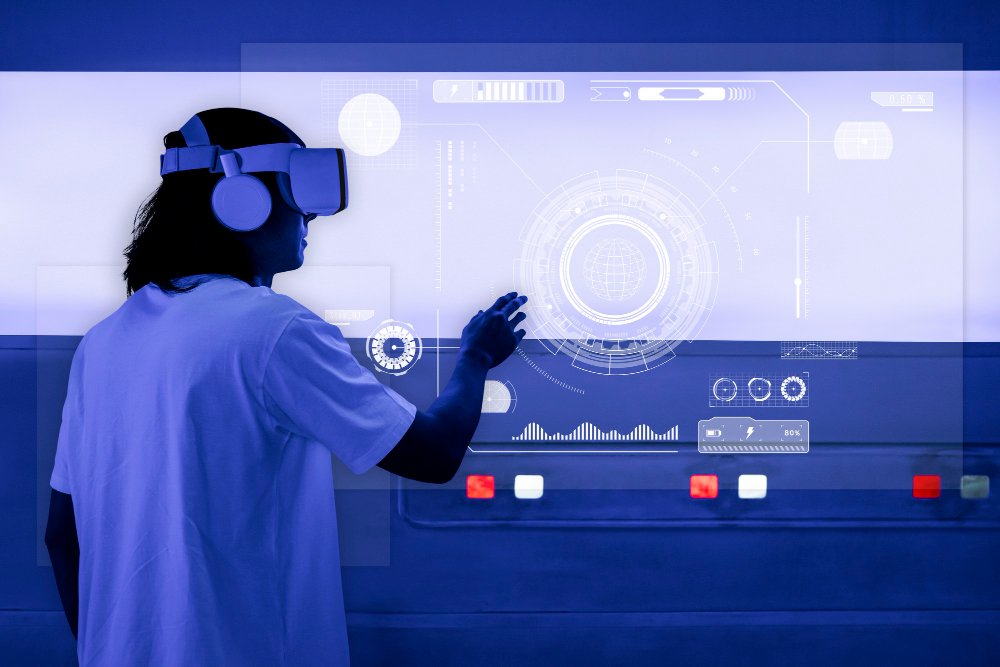
When we think about education, traditional classrooms and textbooks often come to mind. But what if I told you that education is undergoing a digital transformation that is revolutionizing the way we learn and teach? The rise of artificial intelligence (AI) in the AIGC era has paved the way for new possibilities in education technology. From personalized learning to financial literacy management, AI is reshaping the educational landscape in ways we never thought possible.
Key Takeaways:
- Artificial intelligence (AI) is revolutionizing education in the AIGC era.
- AI technologies like generative artificial intelligence (GAI) and ChatGPT are transforming education delivery.
- AI is integrating personal finance management into the education system.
- AI in education offers benefits such as improved learning outcomes and global access to education.
- Challenges and ethical implications of AI in education include data privacy, bias, and the teacher-student relationship.
Now, let’s dive deeper into how AI is reshaping education and personal finance management in the AIGC era.
AI and ChatGPT in Advancing Teaching and Learning Activities
AI and ChatGPT have become indispensable tools in the field of education, revolutionizing teaching and learning activities. These AI technologies offer a range of benefits, such as automated grading, personalized learning, and interactive teaching tools, that enhance the educational experience for both educators and students.
Automated Grading for Efficient Assessments
One of the key advantages of AI in education is its ability to automate grading and assessment processes. With AI-powered systems, educators can streamline their workload by semi-automating the grading of various assignments, such as essays and research articles. AI algorithms can assess and evaluate student work, providing accurate and consistent feedback in a fraction of the time it would take for manual grading. This automated grading system not only saves educators valuable time but also ensures fair and objective assessments.
Through automated grading, educators can also focus more on providing personalized feedback to students. With the assistance of ChatGPT, a versatile AI chatbot, teachers can offer tailored feedback based on individual students’ strengths and weaknesses. This personalized approach not only helps students to improve their skills but also fosters a deeper understanding of the subject matter.
Personalized Learning for Optimal Engagement
AI facilitates personalized learning experiences by adapting instruction according to students’ unique needs and learning styles. By analyzing student data and behavior patterns, AI algorithms can create customized learning pathways that cater to individual strengths and weaknesses. This personalized approach ensures that students receive the support and guidance they need, enhancing their engagement and motivation to learn.
With AI-powered tools, students can access interactive learning materials that adapt to their progress, presenting challenging content or providing additional explanations whenever necessary. This dynamic and personalized learning experience not only promotes better knowledge retention but also cultivates independent learning skills.
Interactive Teaching Tools for Engaging Instruction
AI and ChatGPT offer a variety of interactive teaching tools that make the learning process more engaging and effective. Educators can incorporate AI-driven virtual assistants or chatbots into their lessons to provide real-time assistance and support. These virtual assistants can answer students’ questions, offer explanations, and guide them through complex topics, providing a personalized and interactive learning experience.
Furthermore, AI-powered simulations and virtual reality (VR) experiences allow students to explore concepts in a hands-on and immersive manner. These interactive tools simulate real-life scenarios, encouraging students to actively participate and apply their knowledge. By leveraging AI in this way, educators create dynamic, stimulating learning environments that foster critical thinking and problem-solving skills.
| Advantages of AI in Teaching and Learning Activities | Examples |
|---|---|
| Automated grading | Efficient evaluation of assignments Consistent and objective feedback |
| Personalized learning | Customized instruction based on student needs Adaptive learning materials and resources |
| Interactive teaching tools | Virtual assistants for real-time support Simulations and VR experiences for hands-on learning |
By leveraging AI and ChatGPT in teaching and learning activities, educators can optimize their instructional practices, engage students more effectively, and promote better learning outcomes. These AI technologies offer invaluable support and resources that enhance the educational experience for both teachers and learners.
Next, we will explore the benefits of AI in education, focusing on how it improves learning outcomes, increases time and cost efficiency, and provides global access to quality education.
Want YouTube success, but camera shy?
Tube Mastery 3.0 teaches you to build profitable channels WITHOUT showing your face! ✅ Niche selection, video creation (no camera!), growth strategies & more. See student results: 40,000 subscribers in 5 months & $4,000 daily income! Learn the faceless YouTube method & ditch the camera! ➡️ [Link here]
The Benefits of AI in Education
The integration of AI in education brings forth numerous advantages that enhance the learning experience for students and educators. From improved learning outcomes to time and cost efficiency, AI-powered tools revolutionize the educational landscape, providing a wide range of benefits.
“AI-powered tools can improve learning outcomes by providing personalized instruction and support to students.”
One of the significant benefits of AI in education is the ability to provide personalized instruction and support to students. With AI technologies, educators can gain valuable insights into students’ learning challenges and customize their teaching methods accordingly. This personalized approach ensures that students receive tailored instruction based on their individual needs and learning styles, resulting in improved learning outcomes.
Moreover, AI-powered tools automate grading and assessment processes, saving educators time and resources. Automated grading systems allow for efficient evaluation of assignments, exams, and assessments, freeing up educators to focus on individual student needs and provide more one-on-one support. This not only enhances the learning experience but also facilitates a deeper understanding of students’ strengths and weaknesses, enabling educators to address those areas more effectively.
“AI has the potential to provide global access to quality education, bridging the gap between developed and developing nations.”
An essential benefit of AI in education is its potential to provide global access to quality education. With AI technologies, students from all over the world can benefit from high-quality learning experiences, irrespective of their geographical location or economic background. This bridging of the educational divide between developed and developing nations ensures equal opportunities for learning and knowledge acquisition.
Furthermore, the integration of AI in education can also make the educational process more time and cost-efficient. AI-powered tools automate administrative tasks, reducing the workload on educators and enabling them to allocate more time to teaching and personalized instruction. By streamlining administrative processes, AI technology enhances the overall efficiency of educational institutions, resulting in cost savings and resource optimization.
In summary, the benefits of AI in education are far-reaching, encompassing improved learning outcomes, personalized instruction, time and cost efficiency, and global access to quality education. By harnessing the power of AI, educational institutions can create a more conducive and effective learning environment, empowering students with the knowledge and skills they need to thrive in the digital age.
Challenges and Ethical Implications of AI in Education
While the integration of artificial intelligence (AI) in education brings numerous benefits, it also presents challenges and ethical considerations that must be addressed. Examining these challenges is crucial for ensuring that AI technologies are implemented responsibly and in the best interest of students.
Data Privacy and Security
Data privacy and security are paramount when implementing AI in education. Personal student data, including sensitive information, must be handled with the utmost care to protect confidentiality and prevent unauthorized access. It is essential for educational institutions to establish robust data protection measures, such as encryption and secure storage, to safeguard student information from potential breaches.
Bias and Discrimination
AI algorithms have the potential to perpetuate biases and discrimination if not properly trained and monitored. Bias can occur when AI systems are trained on datasets that reflect societal inequalities or biases. It is crucial to minimize bias in AI systems to ensure fair and equitable educational opportunities for all students. Ongoing monitoring and evaluation of AI algorithms can help identify and rectify any biases that may arise.
The Teacher-Student Relationship
Introducing AI in education raises questions about the teacher-student relationship. While AI can provide valuable feedback and support, it should not replace the role of human educators. Maintaining a balance between AI and human involvement is crucial to ensure a holistic educational experience. Human educators bring empathy, creativity, and critical thinking skills to the learning process, which are essential for fostering a supportive and nurturing learning environment.
“AI should complement, rather than replace, human educators. The unique qualities that teachers bring to the classroom cannot be replicated by AI technologies.”
To address these challenges and ethical implications, it is essential for educational institutions and policymakers to establish clear guidelines and frameworks for the responsible use of AI in education. This includes robust privacy policies, regular audits of AI algorithms, and ongoing professional development for educators to understand AI’s capabilities and limitations. By fostering a culture of responsible AI use, we can ensure that AI technologies in education support positive learning outcomes while upholding privacy, fairness, and the teacher-student relationship.
Future Directions and Opportunities of AI in Education
The future of AI in education is filled with immense potential. As AI technologies continue to advance, there are exciting opportunities for further integration into educational systems. By leveraging AI tools, educators can deliver better learning outcomes through personalized instruction and support. This integration of AI can enhance the overall learning experience for students, promoting engagement and comprehension.
One of the key areas where AI can make a significant impact is in creating immersive learning environments. By utilizing AI, educators can develop interactive educational materials that adapt to the individual needs of students. This personalized approach fosters a deeper understanding of the subject matter and increases student engagement. Imagine virtual reality experiences that transport students to historical events or simulations that allow them to apply their knowledge in real-world scenarios. The possibilities for enhancing the learning experience are endless with AI.
Furthermore, AI can play a crucial role in developing adaptive educational materials. These materials adjust and tailor the content based on the individual student’s progress, creating a personalized learning path. Through adaptive AI technologies, students receive targeted instruction, focusing on their strengths and weaknesses. This personalized approach optimizes the learning process by ensuring that each student receives instruction at their own pace and in a format that suits their learning style.
Continued research and implementation of AI in education will open doors to even more exciting advancements. While AI integration has already shown its potential in improving learning outcomes and providing personalized instruction, the future holds even greater possibilities. As educators and institutions embrace AI, they will be able to create innovative lesson plans, offer tailored coaching to students, and revolutionize the learning experience.
The future of AI in education is bright, promising better learning outcomes and personalized instruction. Embracing AI integration will undoubtedly lead to a transformative educational environment that maximizes student potential and prepares them for success in the digital age.
Conclusion
The integration of AI in education is revolutionizing the way students learn and teachers educate. AI technologies, such as ChatGPT, offer exciting opportunities for personalized learning, automated grading, and interactive teaching tools. Despite challenges and ethical implications like data privacy and bias, the benefits of AI in education far outweigh the risks.
AI has the potential to enhance learning outcomes, provide global access to education, and empower students with essential financial literacy skills. By leveraging AI, educators and institutions can create a more holistic and personalized educational experience. Striking a balance between AI and human involvement is key in ensuring that students receive the best of both worlds.
As we embrace the power of AI, education can be transformed to meet the needs of the modern learner and prepare them for the challenges and opportunities of the AIGC era. Personalized learning, enhanced teaching practices, and improved financial literacy are just the beginning. The revolutionizing impact of AI in education is here to stay, and it’s our responsibility to harness its potential for the benefit of all.
FAQ
How is AI revolutionizing education in the AIGC era?
AI is revolutionizing education in the AIGC era by transforming the way education is delivered. AI technologies like ChatGPT can automate grading and assessment processes, while generative artificial intelligence (GAI) can generate sophisticated digital content. These technologies revolutionize personalized learning and provide interactive teaching tools for educators and students.
What are the benefits of AI in education?
AI in education offers several benefits. It can improve learning outcomes by enabling personalized instruction and tailored support for students. It also saves time and resources by automating grading and assessment processes. Moreover, AI provides global access to education and makes it more cost-efficient by automating administrative tasks.
What are the challenges associated with implementing AI in education?
Implementing AI in education presents challenges such as data privacy and security. It is crucial to handle personal student data with care to ensure confidentiality. Additionally, AI algorithms must be properly trained and monitored to minimize biases and discrimination. The introduction of AI also raises questions about the teacher-student relationship and the importance of maintaining a balance between AI and human involvement.
What are the future directions and opportunities of AI in education?
The future of AI in education holds immense potential. AI technologies can further integrate into educational systems to provide personalized instruction and support. They can enhance learning outcomes by creating immersive learning environments and adaptive educational materials. Continued research and implementation will lead to exciting advancements in the field of AI in education.
How does AI contribute to personal finance management in education?
AI contributes to personal finance management in education by offering students valuable insights and tools for financial literacy and investment. AI technologies can provide students with guidance on how to start investing their money and manage their personal finances effectively.



















